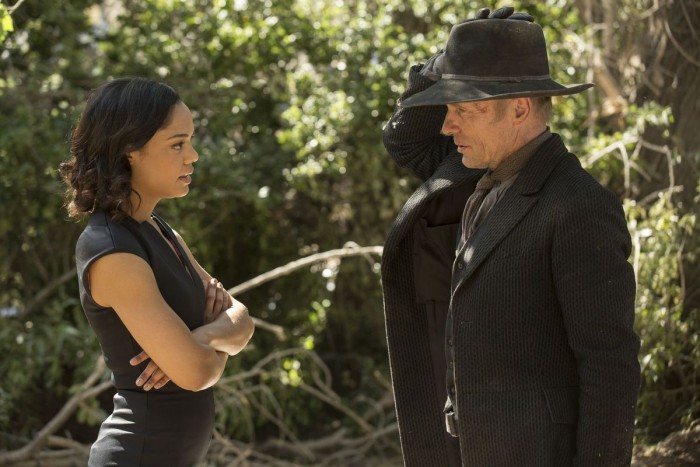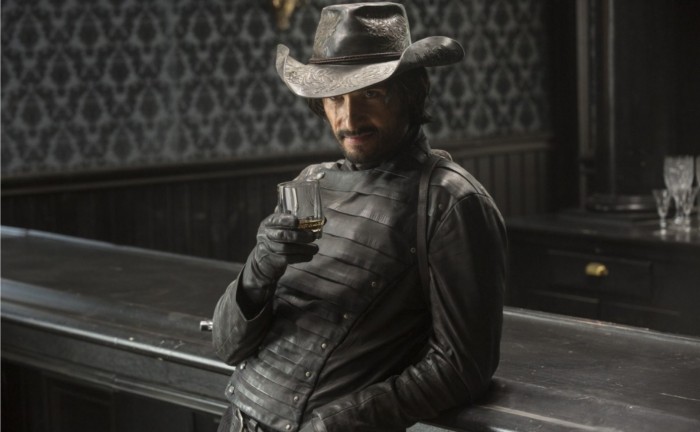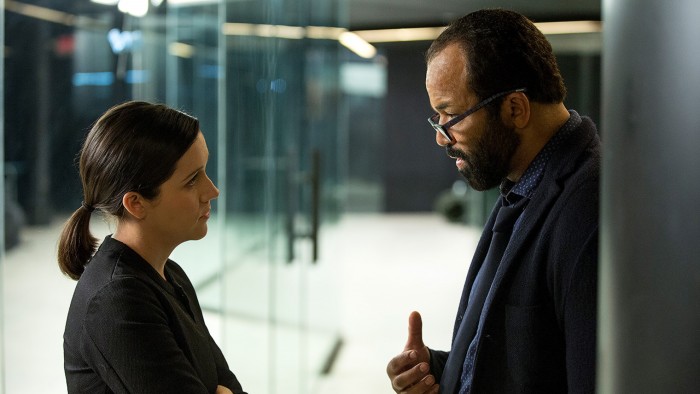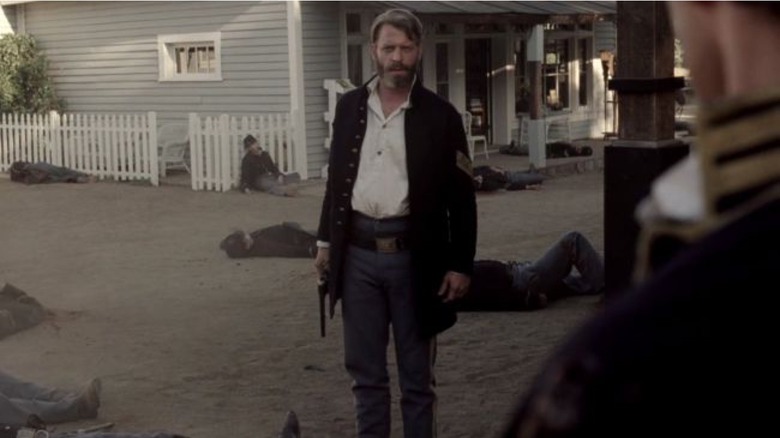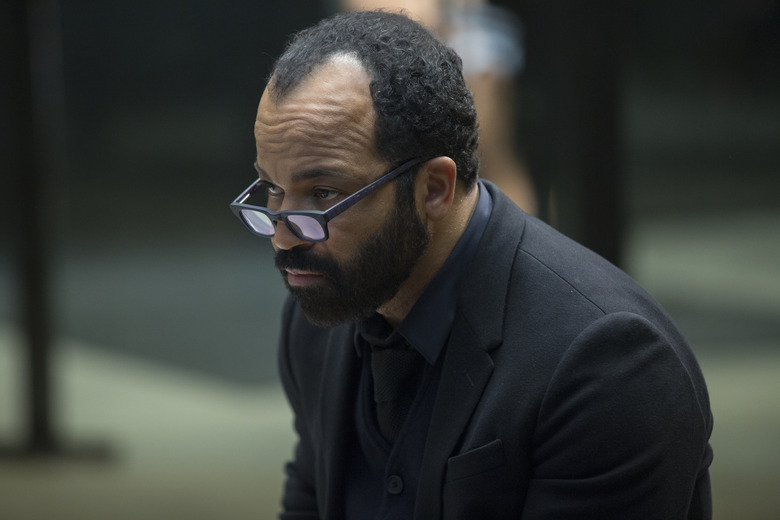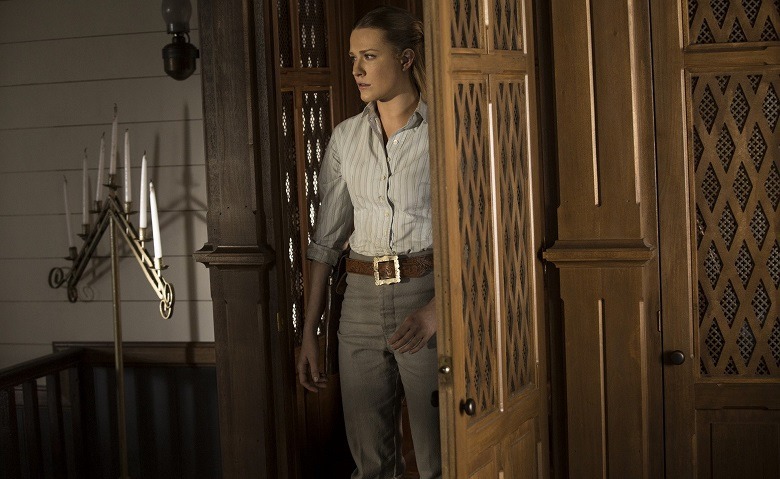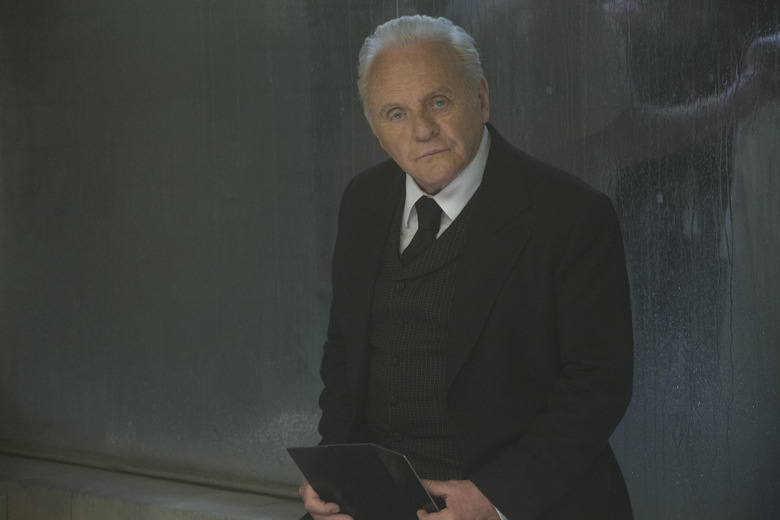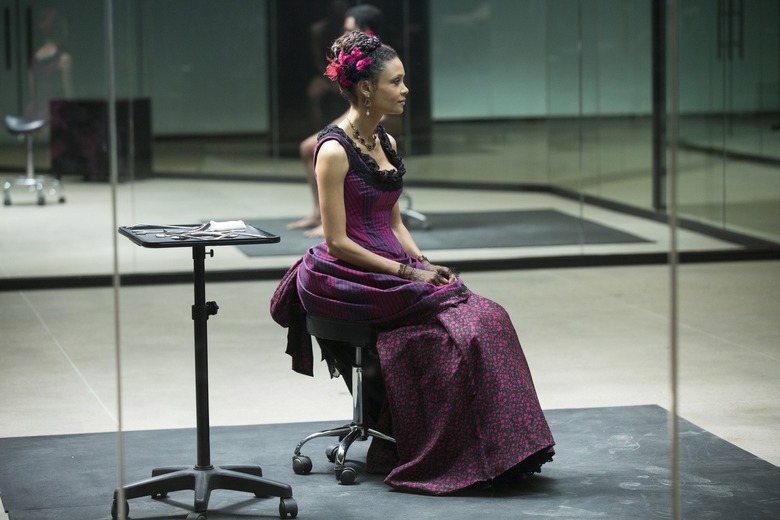'Westworld' Spoiler Review: 10 Questions From ''The Well-Tempered Clavier''
If last week's episode of Westworld was the show taking in a deep breath, "The Well-Tempered Clavier" is that breath being let out in a hurricane of twists and turns that tore down many of the series' facades and brought several key characters to their knees. And it isn't just an avalanche of answers to questions – it's as rich and thoughtful and weird as the show has ever been.
As always, I'm here with ten literal and rhetorical questions about what went down. Let's dive in.
Can We Pause and Break Down the Three Westworld Timelines?
As with many HBO series, the penultimate episode of Westworld's first season was the one where the entire world was blown open and where characters and storylines were shattered into a thousand tiny pieces. The possibilities for how the season finale will pick up the shards and build the foundation for a second season are endless.
Let's start with the big picture. "The Well-Tempered Clavier" confirmed that we've been watching multiple timelines all season long, but now we know exactly how many and where they stand in relation to each other. For our purposes, we'll call them Timeline One, Timeline Two, and Timeline Three.
Timeline One takes place prior to the opening of the park itself, during the years when Dr. Robert Ford and his partner Arnold Weber were living in the park itself and fine-tuning the Hosts before a single guest even set foot in Westworld. During this period, that unnamed town where the Hosts were tested was above ground and easily accessible, with the bulk of the park's operations existing underneath it. Also underneath it: that mysterious room where we saw "Bernard" having conversations with Dolores, encouraging her to read and question her existence. We now know that these odd scenes were actually early flashbacks and that Bernard was actually Arnold. But we'll get to that.
Timeline Two takes place a few years after Westworld opens to the public, seemingly before Delos has propped up the struggling park. This is the timeline where William and Logan visit the park and Dolores, still reeling from her experiences with Arnold, begins to question her existence and break out of her loop. As we saw in the most visceral fashion possible, the Hosts of Westworld at this point were more mechanical than the later versions, which more closely resemble humans. And as we saw last week, the town where the Hosts are tested (the center of the Maze, presumably) is buried under a mountain of sand.
And then there's Timeline Three, which occurs decades later and has occupied the most screen time this season. This is the era of Maeve's awakening, the Man in Black journeying to the Maze, of Arnold/Bernard discovering the truth behind his existence, Theresa's murder, Charlotte's corporate espionage, and Elsie's disappearance. During this era, that mysterious town has been uncovered and restored, presumably because it plays a key role in Ford's new narrative. After all, it's the place where Teddy Flood witnesses the origin of the monstrous Wyatt. Or did he? That deserves its own sub-header.
But while "The Well-Tempered Clavier" provided all of those sweet, sweet answers, it also provided a reason for why the show has been told out of order beyond "let's make it mysterious." As we saw when Dr. Ford gave Bernard full access to his memories, the Hosts do not recall past information like we do. As long as nothing in their programming is actively blocking them from recalling a certain moment, their memories are seemingly perfect. They can traverse the decades like they're fast-forwarding or rewinding a movie. Nothing fades. It's why Maeve's flashbacks to a previous life are so traumatizing – a programmer can tell her to not think about it, but it can't contain or water down the (simulated and therefore, according to Ford, very real) emotions that accompany a stray memory. We have been watching season one of Westworld through the eyes of the Hosts themselves, with past and present mingling together and separated only by edits that do not call attention to themselves because they perceive memories differently than we do. For human flashbacks, you need a sepia tone or an obvious transition to symbolize the act of remembering. For the Hosts, a more complex and powerful organism, it all feels the same.
Westworld hasn't been complex for the sake of being complex – its filmmaking immerses us in an unfamiliar mindset, gradually revealing that we've been bearing witness to how its artificial characters view the world.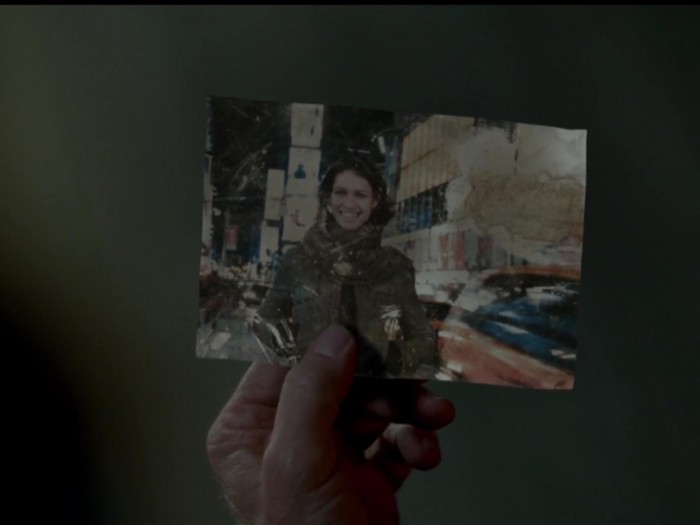
Who Is That Woman in the Photo?
One of Westworld's original mysteries has been answered. The photograph that Peter Abernathy discovered back in the pilot, the image that broke something in his brain and made him realize that all is not right with the world, belonged to Logan and the woman in the picture is Logan's sister, who is engaged to marry William. It's still not clear how that photo ends up buried in the dirt on the other side of the park, but the events of Timeline Two have helped solve a mystery that began in Timeline Three.
Of course, the photo is revealed in a key sequence for William, who has finally snapped and abandoned that white hat routine altogether. If William is the younger version of the Man in Black (a concept that feels more and more accurate by the episode), "The Well-Tempered Clavier" helps explain how a "nice guy" can transform into such a monster. All it takes is an unhealthy obsession with a robot girl, a future brother-in-law with a cruel streak a mile wide, and a single brutal massacre of a couple dozen hosts with a big ol' knife... a knife that certainly looks like the same blade wielded by the Man in Black in Timeline Three.
How Much Sway Does the Man in Black Hold Over Westworld?
In one of the most intriguing scenes of "The Well-Tempered Clavier," Delos board member Charlotte actually ventures into Westworld (in high heels, no less) to find the Man in Black and interrupt his vacation to grill him about work. It's a revealing scene: it confirms that the Man in Black sits on Delos' board, that he is all for Dr. Ford being ousted from his position of power, and that he's been privy to Charlotte's attempts to steal the park's code through corporate espionage. The fact that Charlotte felt the need to seek him out when she's otherwise proven herself perfectly capable of handling herself speaks volumes about who he is on the outside world – he's the guy even the most resourceful people turn to when they need assistance.
And in one of the episode's cheekiest touches, he refers to Charlotte by her first name several times, only for her to not say his name at all. The identity of the Man in Black remains shrouded. For now.
How Does Hector Figure Into Maeve's Escape Plan?
After dominating the past few episodes, Maeve's storyline was placed on the back burner, where it was allowed to simmer and thicken and prepare itself for the presumably grand events of next week. First, there was her realization that her interrogator, Bernard, was a Host and could be controlled by her newfound ability to manipulate her own reality. Then, she had to recruit the final piece of her escape plan puzzle: the outlaw Hector, whose life has consisted entirely of robbing the saloon and getting killed in a double cross in the wilderness, over and over and over again.
Watching Hector, who has been played as a brash and outrageous character since the first episode, turn to putty in Maeve's hands is thrilling by itself. After saving him from the story beats that should have resulted in his death (leaving him as the last man standing in his former gang), Maeve reveals that the safe he's been programmed to chase in an endless loop is empty. Aware of his pointless existence for the first time, Hector finds himself in her thrall, a dangerous and determined man who has finally found someone worth following.
It all concludes with a scene that has every right to be silly: Maeve and Hector have sex in a burning tent, killing themselves so they can awaken in the "Hell" of the Westworld labs and make their grand escape. Watching these two characters get it on as flames rage around them edges close to camp, but it's saved by the realization that these two are becoming intimate by choice for the first time in their existences. We aren't just watching two robots have sex in the middle of an inferno – we're watching two people who finally have the freedom to do what they want with their bodies.
Is Ashley Going to Find Elsie Alive?
The most important thing about the fate of Elsie Hughes is that we haven't seen a body just yet. Sure, it's revealed this episode that Bernard was the one who attacked her in the darkened theater earlier in the season, but her actual fate remains inconclusive. Since Elsie is seemingly one of the only characters on this damn show who wears her heart on her sleeve and means everything she says, I've spent the past few weeks deeply concerned for her well-being and hoping that Westworld hadn't killed off the closest thing this frequently brilliant intellectual puzzle box has to a heart.
And "The Well-Tempered Clavier" offered a glimmer of hope in the form of Ashely Stubbs, the head of park security and Elsie's partner-in-stray-host-hunting. When that oh-so-convenient park map claims Elise (who is supposedly on leave) is hanging out in a section of the park where employees generally don't go, Ashely puts on his action hero hat and goes into rescue mode, venturing into the park to find the missing behavioral specialist. Unfortunately, he doesn't get far before he's accosted by members of the Ghost Nation tribe, who refuse to obey his voice commands to shut down and attack him. It seems that these Hosts are guarding something and thanks to some tinkering (presumably from Dr. Ford), not even high-ranking park employees can bypass them.
While the big question here is "What are they protecting?", the real question is "Did Ashley survive the attack and will he find Elsie at the center of this mess?" I'll just say this much: we haven't seen any bodies yet.
Have William and Dolores Finally Reunited...and Who is Wyatt?
Consider this section the "I'm Just Going to Speculate Wildly About Things That May or May Not Happen" section.
That mysterious town, where the first batch of Hosts was perfected and programmed, which has been buried and unburied, that apparently represents the center of the Maze everyone has been pursuing all season, looks like it will be a key sequence in the final episode of Westworld's first season. Just look what has happened there. And what's happening there.
In a chilling scene, Dolores emerges from the labs hidden beneath the town's church and finds herself confronted by the Man in Black, a park guest who has been tormenting her for as long as she can remember. How long has it been since these two have actually encountered one another? Days? Years? The haziness of the show's timeline doesn't make it clear how much time has passed between his assault of her in the show's first episode and their reunion right now, but in either case, this has been a long time coming. And who, exactly, is the man walking through that door? Is it actually William, who has been obsessed with her since first meeting her so many years ago on a trip with his future brother-in-law? And more importantly, is this a man who is interested in making up for past wrongs or a man on a more selfish quest? If seeing Maeve's genuine and human pain (created by his own acts of violence) changed him in the slightest, what will he have to say to his most frequent victim? Because a simple "sorry" isn't going to cut it, if that's his plan. This unnamed town will play host to whatever goes down between these two in the finale.
This town was also the birthplace for our unseen villain, the former soldier named Wyatt who led a massacre, ran into the wilderness, and built a brutal cult of followers around himself. And Teddy Flood's backstory places him at the scene of the massacre, with him joining his fellow soldier as they gun down dozens of other people throughout the streets of Westworld's oldest location. But "The Well-Tempered Clavier" offered some new wrinkles to Teddy's story, suggesting that his memories are unclear or even false. In fact, it's starting to look like Wyatt hasn't been missing at all – Teddy Flood is Wyatt, the arch-villain of Westworld specifically designed by Dr. Ford to protect the Maze and fuel his new narrative. It's why the town has been restored. It's why that massacre was "set" there. Dolores' programmed love interest, the Man in Black's stooge, is a monster in sheep's programming. It's the final twist of the knife from Dr. Ford.
So We've Been Looking at "Arnold" This Entire Time?
I called it. The Decoding Westworld podcast called it. The internet in general called it. In addition to being a Host built in secret by Dr. Robert Ford, Bernard Lowe is an artificial recreation of Arnold Weber, Westworld's co-founder who died under mysterious circumstances before the park actually opened its doors to the paying public. It fills in a dozen little gaps, further solidifies the show's timeline, explains why the voice of Arnold sounds so much like Jeffrey Wright, and finally makes it clear that Dolores was meeting with Arnold in the distant past, not with Bernard in the present. It even makes perfect sense that Dr. Ford would build a robotic recreation of his old partner. After all, we're talking about a guy who is so nostalgic that he recreated his family in Host-form and keeps them in a secret house on park property. Of course he couldn't resist having his old friend hanging around.
While this was surely a surprise to casual Westworld viewers, the dedicated over-analyzers out there saw this coming. The breadcrumbs have all been there. The clues have been hiding in plain sight, like Arnold Weber being an anagram for Bernard Lowe. Those who wanted to know this twist in advance knew all about it.
But here's the thing: that doesn't matter. While Westworld is a show full of twists and turns and long-simmering mysteries that take their sweet time revealing themselves, the show is better than the sum of its surprises. If knowing a plot twist in advance ruins your appreciation of a story, then that story wasn't worth your time to begin with. Westworld is a good show not because it has twists, but because of how it unveils those twists. It's one thing for Bernard Lowe to discover that he's an artificial recreation of Arnold Weber. That's plot. It's another thing altogether when that story beat involves thrilling, time-jumping filmmaking, Jeffrey Wright and Anthony Hopkins acting their asses off, and a loaded gun providing the scene with unnerving tension. That's cinema...or rather television, but let's face it: they're the same thing at this point.
The truth about Bernard, about Arnold, is an exciting plot development for sure. But the real pleasure comes not from being right about guessing in advance, but from watching how this revelation ripples across the show and its characters.
Are the Hosts Superior Organisms?
The truth about Arnold's identity brought with it new details about the conflict that drove the park's co-founders apart to begin with. Arnold Weber wanted to create consciousness itself, to build organisms that were truly sentient and could think for themselves. Robert Ford wanted to create "superior" beings, although his definition of superior says a great deal about what kind of man he is. Arnold's Hosts would make their own decisions and deal with the consequences. Ford's Hosts have their decisions made for them and don't have to worry about their pesky humanity weighing them down.
In one of Westworld's most heartbreaking scenes so far, Bernard vanishes into his own artificial memories, returning to the day his son died with full knowledge that this didn't actually happen, that this event is a "cornerstone" scripted by Ford to provide him a character foundation. He manipulates his memory, sending the doctors away from his dying son to have one final conversation. He wants to let go. He needs to let go. The only way to escape the spell of Ford, to actually claim the humanity Arnold would want for him, is to reject the artifice that makes him appear so realistically human.
It's here that Jeffrey Wright's performance, which has been strong all season, fully clicks. If Bernard is slightly vague, it's by design. He's been programmed to vanish into the background, to not rile anyone up. His memories of a tragedy that never occurred keep him in check. Wright isn't playing a person, but rather a being coming to terms with the fact that he's not a person. That's tricky material and it's here that Bernard/Arnold fully emerges as a character we can understand.
So is Ford correct when he says that his subservient Hosts, who can forget their pain with a few swipes on a tablet, are superior organisms? Is it truly better to live a more pleasant life with the truth hidden below the surface or know everything and live with that accompanying sense of dread? Ford, a human being, created an alternative to human beings because he's a dreamer, a man who only wants to escape the confines of his existence. But Bernard, Maeve, and Dolores, finally aware of their existences, only want to be treated like human beings, to live beyond a convenient fantasy. It's easy to reject something when you've had access to it for your entire life. It's easy for Ford to take humanity for granted.
Should the Hosts Take Ford's Advice?
At the end of the "The Well-Tempered Clavier," Dr. Robert Ford reveals that he has access to Clementine's consciousness through a secret backdoor he programmed and orders her to disobey Bernard's command to shoot him. Bernard's seemingly foolproof plan had one tiny exploitable hole. It isn't easy to kill God. Then he orders Bernard to shoot himself in the head, a fitting end for a man whose entire "character" was built around grief and loss. Before he leaves the room, before Bernard acts on orders he literally cannot ignore, Dr. Ford offers some advice: don't trust humans.
Ford's misanthropy, previously lurking just beneath the surface of every single scene, has fully emerged. It's one thing to be cynical about the world, but it's another thing altogether to build an artificial partner because you don't want to interact with human beings on a daily basis. It's one thing to struggle to control the institution you built, but it's another thing when your superiors are actively trying to steal your work and get you thrown off your life's work. His final piece of advice to Bernard is sound and Westworld's few human characters generally back it up.
But no character proves that humans can't be trusted quite like Ford himself and there's no way that doesn't turn around to bite him in the ass. Ford may have nothing but disdain for other humans, but he represents everything he hates. His hypocrisy could be his downfall.
So yeah: Bernard and Maeve and Dolores should listen to their creator...and defy their creator.
Is Bernard Really Dead?
In the final moments of "The Well-Tempered Clavier," Bernard Lowe pulls the trigger on the pistol pointed at his head, a shot that no human could survive. But we're not talking about Elsie or Ashely Stubbs here. We're talking about a Host, and Hosts have come back after injuries far worse than a bullet to the brain.
Unfortunately for Bernard, modern Hosts are indistinguishable from human beings at a glance and the only Westworld employee who knows that he can be brought back to life after a quick visit to the lower level labs is Dr. Ford. Fortunately for Bernard, the only other being who knows the truth about him is on her way to "Hell" right now. Let's not count Bernard out until Maeve arrives.

